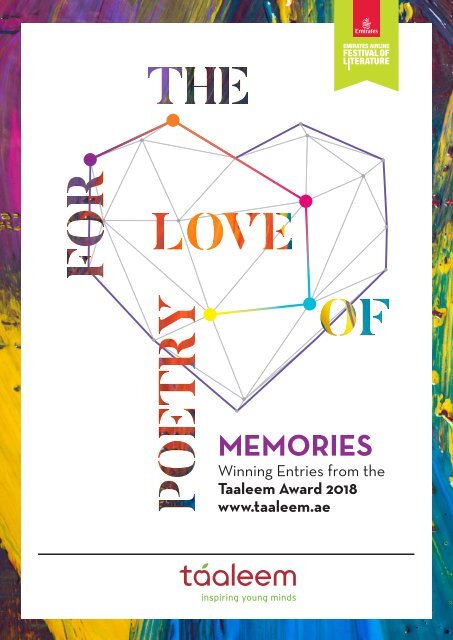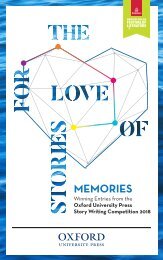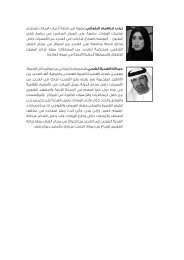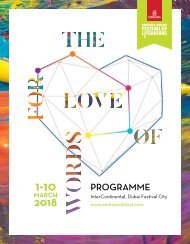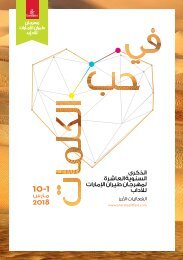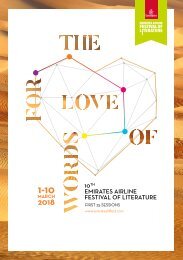Taaleem Award 2018
Winning Entries from Taaleem Award 2018
Winning Entries from Taaleem Award 2018
Create successful ePaper yourself
Turn your PDF publications into a flip-book with our unique Google optimized e-Paper software.
MEMORIES<br />
Winning Entries from the<br />
<strong>Taaleem</strong> <strong>Award</strong> <strong>2018</strong><br />
www.taaleem.ae
<strong>Taaleem</strong><br />
<strong>Award</strong><br />
Memories<br />
Note to readers: please be aware that these winning<br />
poems have not been edited.
Published in <strong>2018</strong> for the LitFest<br />
PO Box 24506 Dubai, UAE<br />
Tel: 00971 4 355 9844<br />
Approved by the National Media Council UAE:<br />
MC-04-01-1273496<br />
Printed by Jamalon FZ - LLC<br />
All rights reserved. No part of this publication may be reproduced, stored in<br />
or introduced into a retrieval system, or transmitted, in any form, or by any<br />
means (electronic, mechanical, photocopying, recording or otherwise) without<br />
the prior written permission of the copyright owners. Any person who does<br />
any unauthorised act in relation to this publication may be liable to criminal<br />
prosecution and civil claims for damages.
INTRODUCTION<br />
<strong>Taaleem</strong> <strong>Award</strong> <strong>2018</strong><br />
“Memories” is an essential theme in poets’ lives. Through it they can bring back and<br />
keep alive unforgettable experiences. Their poetic creativity explodes to produce the<br />
finest and most beautiful poems.<br />
This theme fits perfectly with the tenth edition of the Emirates Airline Festival of<br />
Literature in <strong>2018</strong> to tell the story of a decade of excellence and creativity.<br />
After we announced the theme of the <strong>Taaleem</strong> <strong>Award</strong> this year, we were delighted to<br />
receive entries from students from all of the seven emirates. Their wonderful poems<br />
express the past that still lives in their memories, the past that carries both happiness<br />
and sadness but always gives us hope of a brighter future.<br />
We thank <strong>Taaleem</strong> for their generous support for this unique award. As a specialized<br />
foundation supporting education in the UAE, <strong>Taaleem</strong> understands the importance of<br />
concentrating on youth to allow them to develop their talents in different sectors.<br />
Rosamund Marshall, the CEO of <strong>Taaleem</strong>, says:<br />
“The importance of this Poetry <strong>Award</strong> goes beyond one student, school, organisation or<br />
emirate. It is an open invitation to all the young creative minds to come forward and be<br />
heard. Poetry is a natural component of literature and culture in the UAE and is woven<br />
into its rich heritage.”<br />
We are enormously grateful to the two judges, Frank Dullaghan and Joan Scott-Minter,<br />
for the generous time and meticulous care they put in to choosing the winning poets.<br />
We would also like to thank the teachers who believe in their students’ poetic talents<br />
and the parents who encourage their children to have the honour to win this award.<br />
Now, I would like to invite you all to enjoy reading the poems of the winners of the<br />
<strong>Taaleem</strong> <strong>Award</strong> <strong>2018</strong>!<br />
Eman Al Hammadi<br />
Competitions Manager & Arabic Education Relationship Officer.
CONTENTS<br />
11 and under<br />
Memories ............................................. 8<br />
Aditi Gandhi<br />
Bricks and Birds ....................................... 10<br />
Anna Sofie Vinter<br />
Disappearing Memories ................................. 12<br />
Inaz Violet Humphrey<br />
12-14<br />
Abstract Memories of the Past ............................ 16<br />
Tanvi Tiana Dhingra<br />
Regret .............................................. 18<br />
Araisa Sayyed<br />
In your memory ....................................... 20<br />
Cianna Sarah Vipin<br />
15-17<br />
Gigabytes ............................................ 24<br />
Farida Amr<br />
Why Brain, Why?....................................... 26<br />
Sylvia Elise Waft<br />
Ichor ................................................ 28<br />
Eyad Abdulazim<br />
18-25<br />
We Shall be Remembered ............................... 32<br />
Ayesha Arif<br />
uninvited guest........................................ 34<br />
Neeraja Rajkumar<br />
Roots ............................................... 36<br />
Letitia Jiju
Judge’s Overview for 11 & under<br />
I have always loved reading the poems of this age group. There are often gems and<br />
surprises that come from younger writers. This year was no exception. I am, as always,<br />
aware that there may be some very young children competing in this group and that<br />
the age range is large. However, as I read these poems blind, i.e. I do not have names,<br />
age, or school information, I am unable to tell what sort of an impact this has. In any<br />
event, I am required to judge one poem against another irrespective of any age gap. So<br />
if you’re six years old and your poem hasn’t been chosen, don’t worry. Your day may<br />
well come. Just be pleased you took part. That’s a big deal. And keep writing. I want to<br />
see more poems from you next year.<br />
The judging of these poems was a slow process. Every poem was read at least once.<br />
From the first reading, a short list of 35 poems was compiled for further review and<br />
from this the final selection of winning and highly commended poems was made. Sadly,<br />
I found that three of these poems were copied from the internet and were not the work<br />
of the child. It is clear that teachers could be doing more to filter out copied/partially<br />
copied poems and to explain to the children that this is not acceptable. It is not good for<br />
the children and it’s not good for the competition. I try my best to identify and eliminate<br />
such poems – but I can never be sure. And that’s a sad situation.<br />
That said, I have some great poems and worthy winners to share with you.<br />
Frank Dullaghan<br />
December 2017
11 and under
Memories<br />
Aditi Gandhi, The Winchester School, Jebel Ali, 10<br />
Yes...I gazed in the eyes of a dead bird,<br />
It jolted me to no ends,<br />
The flow of life no more,<br />
The glisten gone,<br />
The blinking and the warmth,<br />
The tweet and the tickle,<br />
The clinging and the fluttering,<br />
The solitude and the silence,<br />
A lump in the mouth…<br />
Yes…I saw my mother,<br />
In the stillness of a stiff moment,<br />
No longer a caress or a chuckle,<br />
Static glare and a still stare,<br />
Lifeless, dull and unbearable,<br />
My heart pounding endlessly,<br />
Swarms of uneasy wriggling,<br />
Choking my innermost being,<br />
The one responsible for my existence,<br />
Was no more,<br />
But alive…she always will be,<br />
In the chambers of my memory lane.<br />
8
This poem begins with an<br />
encounter with a dead bird<br />
and then moves onto the death<br />
of a mother – “Yes…I saw my<br />
mother/ in the stillness of a<br />
stiff moment”. The language<br />
in this poem is simple but its<br />
use is profound, like that ‘stiff<br />
moment’ in the lines quoted.<br />
The emotional impact, as a<br />
result, is, to quote from the<br />
beginning of the poem, “it jolted<br />
me to no ends”.<br />
9
Bricks and Birds<br />
Anna Sofie Vinter, American School Dubai, 9<br />
I think a bad memory is like a brick<br />
We need a lot of them to build a wall<br />
Small bad memories build walls around you<br />
One big bad memory can lead to one big brick<br />
making a wall without taking the time to build it<br />
If we let the bricks get in our way, we won’t be able to go any farther<br />
and in the end we won’t be able to get out.<br />
I think if a wall was built,<br />
We need to spend time to deal with it<br />
Small walls you can jump over<br />
But the tall walls change your yearning to try<br />
It takes time, because that is what a bad memory wants<br />
for time to take you and keep you in the dark<br />
I think a good memory is like a bird<br />
We become colorful and can sing beautifully<br />
Suddenly the walls are lower<br />
because we fly high with our heads in the blurry sky<br />
Our heads are up in the clouds and we feel like we never want to leave<br />
and many people’s goals in life is to become a bird and, if there,<br />
fly over the walls<br />
10
This poem is an extended<br />
metaphor where bad memories<br />
are seen as bricks that can form<br />
a wall that becomes impossible<br />
to climb over. Really bad<br />
memories can be just one big<br />
gigantic brick that can hold you<br />
back all by itself. I love the idea<br />
of this poem and the insight it<br />
provides. Good memories, on the<br />
other hand, are like birds that<br />
allow us to soar over the walls.<br />
Wonderful!<br />
11
Disappearing Memories<br />
Inaz Violet Humphrey, Kings’ School Dubai, 11<br />
“Her mind is different,” they told us,<br />
A fluttering red bird too intricate for its own good,<br />
A building on fire too grand to take down,<br />
A devastating story too heartbreaking to forget.<br />
Her mind had let go of thousands of things,<br />
Starting with dates of wars and deaths of royalty,<br />
But grew worse as days went on,<br />
As her mind had let go of names of family and days of importance.<br />
The curiosity in her eye had disappeared,<br />
Like foul night-birds at the break of dawn.<br />
She had forgotten who I was,<br />
What she called her ultimate supporter and dearest friend.<br />
The sweet pine scent that she used to love,<br />
No longer brought up memories in her mind of home and comfort,<br />
As she had forgotten about that too.<br />
12
Now I sit in a hospital room,<br />
My dear older sister laying sound beside me,<br />
My hand clasped around hers as if we were clueless kids once again,<br />
But we aren’t clueless kids anymore as nothing can be the way it used to.<br />
We are grownup now but I still feel like a kid,<br />
Hoping for my favourite teddy to come out of ‘surgery’ good as new.<br />
A gasp coughed out of her body,<br />
As she shot up to a sitting position.<br />
Heavy breaths enter and exits her body,<br />
As her eyes meet mine,<br />
“Inaz?” she asked.<br />
This poem deals with the difficult<br />
subject of losing memories. The<br />
mind of a sister is described<br />
as “a fluttering red bird too<br />
intricate for its own good”. The<br />
language is mature and the<br />
narrative handled well. This is<br />
another poem that stands out<br />
within this age group both for its<br />
subject matter and its execution.<br />
13
Judge’s Overview for 12-14<br />
The judging of these poems was a slow process. Every poem was read at least once.<br />
From the first reading, a long list of over 130 poems was compiled for further review<br />
and from this two subsequent shortlists were produced, eventually coming down to 37<br />
poems from which to make the final selection. These were the most outstanding poems<br />
from all submitted for this age group. The standard, as you might expect, was high.<br />
However, there is one other thing I have learned to do at this stage. I needed to check<br />
that the poems weren’t copied from books or off the internet. Poems submitted must<br />
be the work of the child. Sadly, I found that more than half of the poems at this stage<br />
of the judging were in fact copied. Some copied poems were submitted multiple times<br />
by different children. Some of these poems were close together, suggesting they came<br />
from the same school. It is clear that teachers could be doing more to filter out copied/<br />
partially copied poems and to explain to the children that this is not acceptable. It is not<br />
good for the children and it’s not good for the competition. I try my best to identify and<br />
eliminate such poems – but I can never be sure I have done so. And that’s a regrettable<br />
place to be.<br />
Frank Dullaghan<br />
December 2017
12 - 14
Abstract Memories of the Past<br />
Tanvi Tiana Dhingra, GEMS International School Al Khail, 14<br />
When I was 10;<br />
I saw a person’s life flash before my eyes and I knew that those were my memories,<br />
I was too late…<br />
When I was 9;<br />
I felt the heat of a burning house and I knew the smell of burning flesh would be<br />
remembered,<br />
I couldn’t do anything…<br />
When I was 8;<br />
I saw a woman kneel down and show me a ring and I knew I would say yes,<br />
I was flying with the stars…<br />
When I was 7;<br />
I saw an angel come down and I knew I was special,<br />
I was changed…<br />
When I was 6;<br />
I stood over a dead man’s body and I knew the blood on my hands wasn’t mine,<br />
I cried…<br />
When I was 5;<br />
I looked in the mirror and I knew that wasn’t my face,<br />
I was filled with a whirlwind of emotions…<br />
16
When I was 4;<br />
A woman stepped in front of me and took a bullet to the chest<br />
and I knew she shouldn’t have,<br />
I wasn’t her daughter…<br />
When I was 3;<br />
I saw rivers polluted and forests felled and I knew I had to do something,<br />
I didn’t know what to do…<br />
When I was 2;<br />
I jumped into the sea and talked with the fish but I knew my tail wasn’t real,<br />
I didn’t believe in the impossible…<br />
When I was 1;<br />
I saw ashes and fire and bones and I knew the world was ending,<br />
I didn’t know the worst was yet to come.<br />
This is a highly unusual poem<br />
for the age group – enigmatic,<br />
challenging. It is one of those<br />
poems that seems to take you<br />
to a different place, perhaps<br />
memories of past lives, perhaps<br />
just a different thought process.<br />
But this uniqueness and<br />
particularity is the real stuff of<br />
poetry. The poem stood out for<br />
this reason and suggests that<br />
the poet will produce other<br />
strong poems in the future.<br />
17
Regret<br />
Araisa Sayyed, The Apple International School, 14<br />
Regret washed her<br />
Like the slow waves on sandy beach.<br />
Each wave was icy cold.<br />
That sent shivers down her spine.<br />
How she longed to go back<br />
And take a different path,<br />
There was no way back.<br />
There was no way back.<br />
The remorse would eat her day and night.<br />
She wished to be pebbles,<br />
Cold and lifeless,<br />
To the torments of life.<br />
Regret is eating her,<br />
Like an infection.<br />
Bit by bit with passing time.<br />
It sweep her like waves ashore,<br />
She shouldn’t have done it at all.<br />
Can she ever make it right?<br />
She just doesn’t know how.<br />
How she longed to go back<br />
And take a different path,<br />
There was no way back.<br />
There was no way back.<br />
18
In a series of similes, the nature<br />
of regret is conveyed. We are not<br />
told what caused this regret.<br />
We do not need to know.<br />
The aptness of the images, the<br />
considered line breaks, and the<br />
apt use of repetition, show off<br />
a skill level not often seen at<br />
this age. This is a well-deserved<br />
second place in a highly<br />
talented field.<br />
19
In your memory<br />
Cianna Sarah Vipin, RAK Academy, 12<br />
It’s hard to forget you when you gave me so much to remember,<br />
The way you laughed, how your eyes glowed like ember<br />
Down my cheeks roll all our memories<br />
How we fixed each other like a puzzle and its final piece<br />
I think of you, each second, every hour of each passing day<br />
I got too attached, even though I knew you wouldn’t stay<br />
You said you could take a storm but I was a hurricane<br />
I knew you couldn’t take it, but I let you in anyway<br />
My memory still loves you, it asks about you all the time<br />
I knew you could make me laugh, I didn’t realize you could also make me cry<br />
We were inseparable for what seemed like centuries<br />
But now we’re just strangers with some powerful memories<br />
20
This is a love poem. Love poems<br />
in this age group tend to be<br />
sentimental, too telling. But this<br />
one lets the images carry the<br />
emotional weight – “how we<br />
find each other like a puzzle and<br />
its final piece”. It feels authentic.<br />
It feels just right.<br />
21
Judge’s Overview for 15-17 & 18-25<br />
Altogether there were over 350 entries in these age groups which, although that made<br />
judging a long process, was very encouraging. It was discouraging, however, to find<br />
so many poems which did not conform to the theme or were plagiarised, and many<br />
promising poems had to be dismissed out of carelessness. If you are going to enter<br />
a competition, then make it your best effort. My personal thanks go to those students<br />
who took their time to eliminate errors of grammar and punctuation in order to craft<br />
their best work.<br />
“Memories” proved to be an excellent theme with many varied approaches and some<br />
really memorable, original and personal responses. The shortlists were long and final<br />
choices difficult to make. Response to poems is personal – like listening to music; the<br />
winning poems were those that kept on resonating regardless of time of day, weather<br />
or my mood!<br />
Thank you <strong>Taaleem</strong>, parents and teachers for your continuing support, enthusiasm and<br />
encouragement.<br />
Joan Scott-Minter<br />
December 2017
15 - 17
Gigabytes<br />
Farida Amr, Emirates International School, Jumeirah, 15<br />
One day, I promise, I’ll grab you by the hand,<br />
I’ll drag you off this lonely land.<br />
I’ll break through your walls, brave through your spikes,<br />
To rescue you from that world of hashtags and likes.<br />
Can you remember, my dear, how it was before?<br />
Colours, lights, emotions galore!<br />
But now that old slate has been wiped clean,<br />
Our only light these days comes from our screen.<br />
Folded notes forgotten, now we just text<br />
I wonder what we’ll stop doing next?<br />
A shoebox on our top shelf holds mixtapes, photos, pens,<br />
Now we can only see the world through a Snapchat lense.<br />
We’re living in bubbles, each to his own ,<br />
Oblivious, as we get swept away by the cyclone.<br />
So tell me, my darling, when did we become so trite,<br />
To measure memories in gigabytes?<br />
24
The first two rather prosaic lines<br />
of Farida’s poem seem not to<br />
fit with the title and do not give<br />
a hint of what is to follow – a<br />
look at modern communication<br />
with a view of a future devoid<br />
of romanticism – a “world<br />
of hashtags and likes”. The<br />
controlled rhyme and rhythm<br />
perfectly reflect the speed at<br />
which technology develops<br />
and begins to dominate and<br />
eliminate more old-fashioned<br />
ways of recording and<br />
preserving memories: “colour,<br />
lights, emotions galore.” She sees no romance in “Snapchat and texts”<br />
unlike “photos” and “folded notes”.<br />
“Gigabytes” is refreshing in its modernity and relevance and perhaps<br />
alerts us or echoes what many people see and fear are the dangers of<br />
technology. Well done Farida.<br />
25
Why Brain, Why?<br />
Sylvia Elise Waft, Dubai College, 16<br />
Neurons, synapses, electrical impulses,<br />
The brain drives; we ride,<br />
No map to guide us.<br />
A tangled task,<br />
Which memories stay and which go?<br />
Could it be random?<br />
Memories assigned a number<br />
From one to ten;<br />
Even numbers stay!<br />
So I remember the colour of my bedroom when I was six,<br />
Not my grandmother’s face.<br />
Perhaps self-improvement.<br />
The brain wants us to learn,<br />
And not repeat mistakes.<br />
Bad memories warn us.<br />
So I remember the failed exam,<br />
Not the question I got right.<br />
Maybe it’s cruelty.<br />
No forgiveness for you, ha, ha, ha!<br />
26
Spotlights on the bad,<br />
Good shoved offstage.<br />
So I remember the harsh words between us,<br />
Not the laughter we shared.<br />
Which is true? Any? All? None?<br />
Complex and unexplained,<br />
The brain is a master machine.<br />
A simple memory is joy in a moment,<br />
Tears in eyes,<br />
Or lost forever.<br />
Sylvia’s poem echoes the idea of<br />
other entries about how memory<br />
works but at a more specific,<br />
scientific and humorous level.<br />
The title is apposite: why does<br />
the brain choose which things<br />
we remember? She plays with<br />
the good/bad results of how<br />
‘the brain drives” and “we ride”<br />
as though we have no control<br />
over the choice. She questions<br />
whether it is random, or so<br />
we can learn, or just cruelty.<br />
Memory is given a real character<br />
and voice: “no forgiveness for you ha, ha, ha!” Each stanza supports its first<br />
line and ends with the choice to be made between good and bad memory.<br />
I particularly like the elegant and rather poignant ending “A simple<br />
memory is joy in a moment”– a satisfactory conclusion to an interesting<br />
and well-developed poem.<br />
27
Ichor<br />
Eyad Abdulazim, Pristine Private School, 15<br />
A house that overflows with memories,<br />
From its windows seep clear tears;<br />
Some droplets as fresh as roses,<br />
Others as salty as fear.<br />
A garden that blooms through rains,<br />
And winds, and shakes, and blows;<br />
May just grow the weakest shrubs,<br />
Or have lilacs purple in rows.<br />
Fingers, chipped and nipped,<br />
Cut, scratched, and scarred,<br />
From the hardest of work,<br />
Or the softest guitars.<br />
A heart, broken to a million pieces,<br />
Bitten by a thousand snakes,<br />
May become numb and weary,<br />
Accustomed to the aches,<br />
Or just beat that much stronger,<br />
Ready to make the chase.<br />
The tears from the windows,<br />
The tunes of the guitar,<br />
The millions of pieces,<br />
The countless scars,<br />
They run through our veins like ichor,<br />
Making us who we are.<br />
28
Similar to Sylvia’s poem, Eyad<br />
also uses negative and positive<br />
outcomes to circumstances<br />
outside our control. Ichor, the<br />
ethereal blood of Greek Gods,<br />
suggests that it is chance which<br />
determines the outcome and<br />
which is ultimately responsible<br />
for “making us who we are.”<br />
Generally this is a wellconstructed<br />
poem with good use<br />
of rhyme and rhythm.<br />
29
18 - 25
We Shall be Remembered<br />
Ayesha Arif, International Training Institute, 18<br />
The Future has come knocking at my door today.<br />
It comes bearing calendars and, <br />
Tells me I have had six thousand five hundred and seventy days of my life, <br />
Asks me why I refused to live them.<br />
I tell him I am afraid that I will have six thousand five hundred and seventy days more,<br />
And I will not remember any of them either, <br />
That I will fade away into the night, forgotten.<br />
And so it wraps me unceremoniously in its arms and says:<br />
“You were born when autumn walked barefoot on the cooling earth,<br />
Trailing the burnt gold of farewell in her wake.<br />
You were born under the cover of the night,<br />
And your battle cry roused it from its slumber,<br />
Forcing the constellations to burn themselves brighter to lull it back to sleep.<br />
And your name was perfectly engraved onto the stars,<br />
That not even a hundred black holes can wipe away.<br />
Child, <br />
You are an explosion of colors waiting to happen.<br />
Of course, <br />
It is just an ephemeral blink of eternity.<br />
32
And of course,<br />
You too will fade away into icy darkness one day. <br />
But like the leaves, <br />
You will hold on with tenacious ferocity till you are able.<br />
Perhaps, <br />
This is how you will inspire. <br />
This is your legacy.”<br />
“We Shall Be Remembered” is an<br />
apposite title because this is one<br />
of the most memorable poems<br />
this year. The reader is captured<br />
right from the beginning. At first,<br />
the tone is negative: the speaker<br />
is afraid of not remembering<br />
and will “fade into the night,<br />
forgotten”.<br />
The single line “And so it wraps<br />
me unceremoniously in its arms”<br />
is arresting; then the imagery<br />
and musicality of the poem<br />
become enchanting: “You were<br />
born when autumn walked barefoot on the cooling earth” and “Child,<br />
you are an explosion of colours”. The final stanza is effective because it is<br />
simple and elegant and positive.<br />
Ayesha has shown great control and poetic ability; there are no errors,<br />
nothing unexplained or unnecessary. This is a poem truly deserving of first<br />
place. Thank you Ayesha.<br />
33
uninvited guest<br />
Neeraja Rajkumar, National Film and Television School, 23<br />
there is an uninvited guest outside my door<br />
he is knocking, light and quick and i am not his friend<br />
my hand does not turn the handle; the door remains closed<br />
but despite it, in he comes.<br />
His name? Time.<br />
he is a magician, bewitching me with his sleight of hand<br />
the smallest of blinks and here i am, age 15.<br />
another blink: 27. 34. 52.<br />
not spiders or heights, nor demons or ghosts - i fear him.<br />
for he is an invisible thief; swift on his feet and omnipresent<br />
no one can catch him - no one can find him - for he is no one.<br />
he looms at large, hovering behind every corner on every street.<br />
it seems like yesterday my mother told me<br />
i was to have a brother! chubby ankles and soft cheeks<br />
eyes as dark and luminous as marbles, he holds on to my finger<br />
as if his life depended on it; it is the most beautiful thing in the world.<br />
time comes by, ever the courteous stranger,<br />
waves his deft fingers: stretches out my little brother like a reed<br />
so much so he is no longer little at all - gone are his stout legs,<br />
his pout of a belly, his fondness of all things stuffed and soft.<br />
all that remains are his linen eyes; that, time cannot take.<br />
sometimes i hid in places where he couldn’t find me:<br />
the rooftop of my childhood home, before the sun awoke<br />
and all the world was still (every breath felt like the first).<br />
34
at 2 pm lunch break; the giggles and furtive secrets shared between two<br />
in the hush of the stairwells at school.<br />
the cosy spot by the window in my first apartment<br />
chai cup warming my cold hands as the rain poured heavily outside.<br />
the more time took, the more i learnt as he let loose leaves of truth:<br />
let every unbridled moment burn like the stars against the black of the night<br />
each twinkling bright with their own memory -<br />
long gone, but never truly lost.<br />
“uninvited guest” is a title which<br />
tempts you to read on – who<br />
is the uninvited guest, what<br />
part does he play – and you are<br />
rewarded with good storytelling,<br />
excellent imagery and a<br />
satisfying positive ending. Time<br />
is personified as a magician,<br />
invisible thief, a courteous<br />
stranger who bewitches “with<br />
his sleight of hand” so that<br />
the years pass too quickly and<br />
changes happen before we are<br />
ready for them. I love Neeraja’s<br />
description of her new baby brother and the clever image of Time quickly<br />
stretching him out. It is sentimental without pathos and I smile as I imagine<br />
brother and sister playing together and staying friends as grown ups.<br />
The final stanza reveals the lesson to “let every unbridled moment burn like<br />
the stars…” “long gone, but never truly lost” – like your poem, Neeraja!<br />
Well done.<br />
35
Roots<br />
Letitia Jiju, Manipal University, 22<br />
Long before adolescence had bit into my flesh and gradually<br />
Over the years sank its teeth into my soul, sly predator<br />
I had a fondness for mangoes from Kottayam.<br />
The kind that swayed in the dull moist wind -<br />
We had a tree whose roots seemed ethereal.<br />
My grandfather seemed to know exactly when the mangoes<br />
Were to break away from their temporary attachments.<br />
He never could make any such premonitions about his own children.<br />
He often cites this as one of his failures and even if he doesn’t articulate it -<br />
I know this.<br />
He would quickly climb a ladder, pluck each wobbly young mango<br />
One by one and hand them to me. My grandmother would<br />
Peel their skin, slice them into cubes and feed me.<br />
She’s partially deaf now. The other part,<br />
She pretends most of it. Her selective hearing is her disposition,<br />
Not from aging or peeling away mango skins or her children.<br />
She wears it like a cloak at nights, walks the hallways, a captive<br />
In her own home, steals short-lived glances of her grandchildren asleep.<br />
The crickets can hear her.<br />
They always do.<br />
Silence has settled into this house the way a dying moth rests its cold wings.<br />
The mango tree was cut years after the moth had died.<br />
36
I cannot look at my grandfather, his hunched back, protruding belly<br />
As if he stomachs his loss. My grandmother’s mouth<br />
Breaks into the saddest smile and I pray that I’d never have to see it again.<br />
Her detergent hands cup my face and I smell the mangoes.<br />
And I hear the crickets.<br />
And I see the dying moth.<br />
And I wonder if my lineage is of inherited ghosts.<br />
Letitia’s personal reminiscence<br />
of her grandparents and the<br />
mangoes is an understated<br />
poem which sounds quite<br />
colloquial, yet is cleverly<br />
constructed and full of images;<br />
adolescence is a “sly predator”;<br />
“silence has settled into<br />
this house the way a dying<br />
moth rests its cold wings”;<br />
grandmother’s “detergent<br />
hands”.<br />
I particularly like the descriptions<br />
of grandfather’s “hunched back,<br />
protruding belly as if he stomachs his loss” and grandmother’s partial<br />
deafness: “The other part, she pretends most of it. Her selective hearing is<br />
her disposition. …She wears it like a cloak at nights.”<br />
This is good storytelling in a poem which gets better with every reading.<br />
Well done Letitia.<br />
37
Frank Dullaghan lives in Dubai. He holds an MA with Distinction in Writing from the<br />
University of South Wales. Whilst in the UK he co-founded the Essex Poetry Festival<br />
and edited Seam Poetry Magazine. He has published three poetry collections (On<br />
the Back of the Wind, 2008, Enough Light to See the Dark, 2012, and The Same<br />
Roads Back, 2014) from Cinnamon Press in the UK, and two haiku collections.<br />
Frank has run workshops in poetry and short story writing in schools, university and<br />
for various literary and writing groups. His screenplay Melody featured in the best<br />
short films Dubai 48 hour Film competition 2012 and won the audience award in the<br />
Mumbai Women’s International Film Festival 2013. He has also written short stage plays which have been<br />
performed in Dubai. In 2014, he provided the final English poetic translations (from literal translations) for His<br />
Highness Sheikh Mohammed’s book, Flashes of Verse.<br />
Frank’s fourth collection, Lifting the Latch, is due out from Cinnamon Press in May <strong>2018</strong>.<br />
Joan Scott-Minter came to Dubai in 1989 as a full-time teacher and, although<br />
she retired in 2000, she has continuously been involved in children’s education<br />
and children’s literature as a teacher, writer, mentor and editor. Her first musical<br />
Nagwaja, published by Maverick Musicals in Australia, has been performed in many<br />
countries including Dubai. Joan has been involved with the Emirates Airline Festival<br />
of Literature since its inception and remains enthusiastically committed.
زينب إبراهيم البلوشي،عضوة في رابطة أديبات اإلمارات ومنتدى<br />
شاعرات اإلمارات. حاصلة على المركز السادس في برنامج شاعر<br />
المليون – الموسم السابع، شاركت في العديد من األمسيات داخل<br />
وخارج الدولة وحاصلة على العديد من الجوائز في مجال الشعر<br />
الشعبي، ومحكمة للعديد من المسابقات منها: شاعر المليون<br />
لألطفال والمسابقة الدولية )النخلة في غيوم العالم(<br />
عبداهلل الهدية الشحي، شاعر وباحث إماراتي من مواليد رأس الخيمة،<br />
وهو من شعراء القصيدة العربية الفصحى والنبطية، ألّف العديد من<br />
األناشيد الملحمية، وما يعرف بفن األوبريت، شارك في العديد من<br />
األمسيات داخل وخارج الدولة، ومثّل اإلمارات في األسابيع الثقافية<br />
في عدة دول، كما أسهم في الحركة األدبية والمشهد الشعري<br />
من خالل المحاضرات واألمسيات الكثيرة في المراكز والمؤسسات<br />
والنوادي واتحاد كُ تّاب وأدباء اإلمارات، يعمل الهدية على تكريس حب<br />
الشعر الفصيح والنبطي وعلم العروض والقوافي، له عدة إصدارات:<br />
»ابتسام العمر« و»إلى متى« و»أين أنت«، ينشر قصائده في مختلف<br />
الصحف والمجالت داخل وخارج اإلمارات، وقد حصل الشاعر عبداهلل<br />
الهدية الشحي على العديد من الجوائز في مجال الشعر، منها جائزة<br />
العويس لإلبداع عن ديوانه »الباحث عن إرم« كأفضل ديوان شعر .


